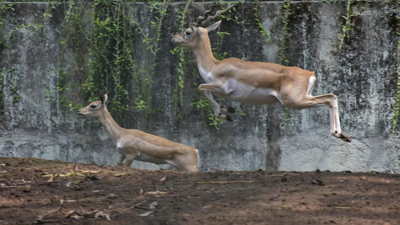ARTICLE AD BOX

Blackbuck toll climbs to 31, K'taka zoos on high alert
BENGALURU: With the blackbuck death toll in the state rising to 31 Monday, nine zoos across Karnataka have been told to step up vigilance to prevent similar outbreaks among their animal population.The deaths, reported from Kitturu Rani Chennamma Mini Zoo in Belagavi, are suspected to have been caused by haemorrhagic septicaemia (HS) - a bacterial disease. The zoo's blackbuck population has dropped to seven.Forest department officials said this is the first instance of antelopes dying on such a massive scale in Karnataka. HS is a fatal disease that commonly afflicts cattle and buffaloes, but blackbuck, chital, nilgai, and deer are also susceptible.
Executive directors of zoos in the state have been directed to heighten surveillance.The zoo housed 38 blackbucks in total. Eight died on Thursday, and their post-mortem reports are expected on Tuesday. Despite immediate treatment of the surviving animals, 20 more blackbucks died suddenly on Saturday, raising the toll to 28. The deaths continued over the following days, with two more on Sunday and one on Monday morning, prompting serious concerns over the rapid spread of the infection.
Zoos instructed to firm up biosecurity measuresThe Zoo Authority of Karnataka (ZAK), Mysuru, issued an advisory Sunday, with one more notification issued the following day, directing all executive directors of zoos to heighten surveillance.The ZAK communication, accessed by TOI , cautions that if any suspected health complication is observed, it must be immediately reported to the health advisory committee of the respective zoos.
ZAK has also sought updates from zoos on the implementation of the action plan.Prabash Chandra Ray, principal chief conservato r of forests (wildlife), told TOI : “We have isolated the blackbucks from the rest of the animals. All prophylactic measures are being taken. Zoo authorities have been advised to stay alert and check for potential infection sources, especially amid sudden temperature dips.”Dr Sunil Panwar, chief conservator of forests and member-secretary of ZAK, said while HS is contagious, “the infection was fortunately localised within the blackbuck enclosure only”.The ZAK advisory emphasises immediate removal and safe disposal of all carcasses as the first line of outbreak control, along with quarantining of suspected animals and administering antibiotic prophylaxis to the remaining population.Zoos have also been instructed to strengthen biosecurity measures, ensure clean water sources to ensure a hygienic environment, control stress factors during handling and transport of animals, and prevent contact between domestic and wild herbivores.Domestic herbivores around the zoo are to be mandatorily vaccinated.

 1 hour ago
5
1 hour ago
5









 English (US) ·
English (US) ·